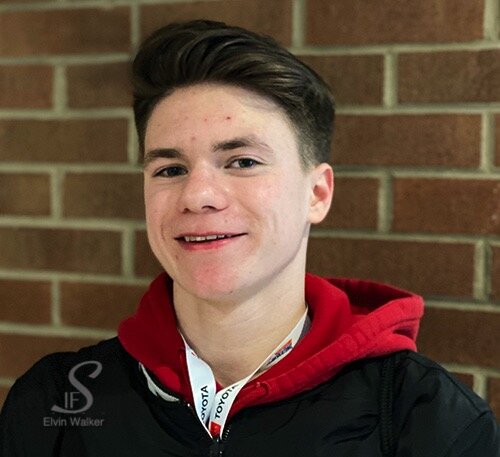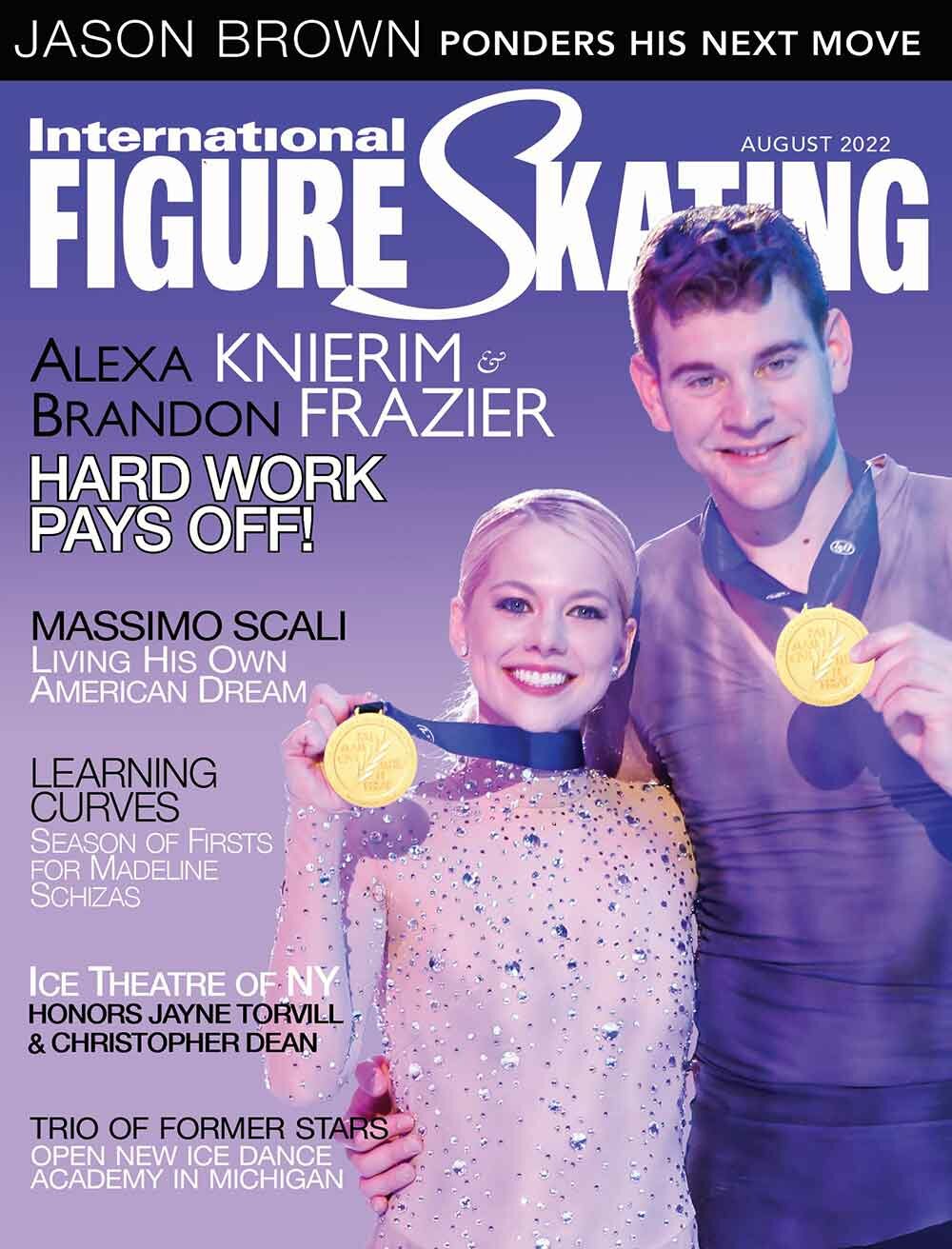

When Maxim Naumov arrived on the international junior stage in 2017, his name turned heads right away. Wait a moment, many asked, wasn’t there a Russian pairs skater with that name?
There was indeed, and both members of that pairs team — Evgenia Shishkova and Vadim Naumov — just happen to be his parents.
Shishkova and Naumov captured a complete set of medals at a trio of World Championships (bronze in 1993, gold in 1994 and silver in 1995), and claimed steps on the podiums at five European Championships (1991-1995). At their two Olympic appearances the team finished fifth in 1992 and fourth in 1994.
Shishkova and Naumov married in 1995 and retired from competition in 1998. The couple moved to the U.S. to start coaching careers in Hartford, Connecticut, where Maxim, their only child, was born three years later.
When your parents were successful competitive skaters who now coach, the chances are high that donning a pair of skates will be one of the first things you do. That is what happened to Maxim, who remembers being put into a pair of skates at age 3. His parents wanted to see whether he liked it or not, but “apparently, I didn’t show much interest in it right away, so they were like, ‘OK, we will give him two more years,’” he recalled.
When his parents brought him back to the ice two years later, Maxim was more receptive to the concept of skating. “I started going to the rink once a week, and gradually it moved up to five times a week,” he said. “To say I never had a choice is probably not totally true. There was a very big influence, of course, but there was no pressure.”
Introducing their son to the sport also provided a convenient solution for Shishkova and Naumov. “We are all day long in the rink and he had to be looked after. It was easier for us to keep him near,” Vadim explained. “And, obviously, we wanted to see if he had any talent for figure skating.”
Maxim showed promise from the beginning. Four years after winning the 2013 U.S. juvenile title he claimed the novice crown. In the fall of 2017, he finished eighth at a Junior Grand Prix event in Riga, Latvia, and went on to win the bronze medal at the 2018 U.S. Junior Championships.
But it was his victory at the juvenile level five years earlier that made Maxim realize he was serious about skating and that he wanted to achieve something in the sport.
In January 2020, he claimed the U.S. junior title and qualified for his first World Junior Championships. In Tallinn, Estonia, he ranked 10th in the short program, finished fourth in the free skate and pulled up to fifth overall. He emerged as the top American man at that competition, with Andrew Torgashev and Ilia Malinin finishing eighth and 16th, respectively.
“Just getting to the World stage has given me so much more motivation to keep going,” Maxim said. “I went into the competition not knowing what was going to happen — I just kind of went there for myself, to do the best I could. I trained well, as if I was training for any other competition and I didn’t focus on any of the other competitors.
“I was expecting a very big technical side with many of the guys doing all the jumps. Seeing it in person was a little bit different, obviously. Sharing the ice with people who do all the jumps was pretty cool. Nothing too crazy, but it definitely showed me that I have a lot to work on. I still can’t even believe where I ended up. It is kind of all just falling into place right now. It is everything and more than what I had expected. It gave me a lot of motivation for next season.”
As the only top-level skater at his rink in Boston, Massachusetts, Maxim understands that self-motivation is his most important weapon when there is no one at his level to push him. “You have to find that inside yourself and you have to use your inner motivation to push yourself to do better things,” he said.
Focusing on what he was doing — and what he needed to do — was perhaps his strongest weapon at Junior Worlds. “I really just focused on myself and put aside any thought of medals, podium placement, points or anything else. I understand that even if you’re in contention for first, second or third, just focus on your program, focus on your training. That is kind of the most important thing because then you put less pressure on yourself. You just kind of do your own thing and let the judges decide where you end up.”
Maxim has benefited from his parents’ experience as high-level athletes. They taught him to treat every competition the same way, no matter what level he is at and no matter how high the stakes are. “They have taught me how to calm myself down and kind of just take one thing at a time,” the 18-year-old said. “They know me better than anybody — on and off the ice — and only want what’s best for me. Having that strong family connection is something very special. It is unique and I am very lucky to have them as my coaches.”
The disadvantage is that sometimes it is hard to separate the different relationships between parent and son, and coach and student. “Let’s say I have a good day, and I go home and everything is great. But if I have a bad day, I go home and it is also bad. That is tough,” Maxim explained. “We are trying to find a balance between them being parents and coaches, and me being a son and a student. But I think we are doing a great job. It was difficult before, but it is getting easier now that I’m getting older and understand a lot of the things they tell me.”
Shishkova agreed. “It is hard. As Maxim correctly said, when he was little, he maybe didn’t realize fully what he could do and how he needed to work because there were never very strong skaters at our rink. He was always the leader. He would say, ‘I am doing everything as you told me. I am doing enough,’ but he couldn’t even imagine how you really need to train in order to reach a high level. Therefore, we had a lot of problems when he was younger. But now that he has grown up, he has started to understand and started to push himself.
“I catch myself thinking that I feel sorry for him. I’m also his mother. So, on one hand we need to push him to his limits, and on the other hand I feel sorry for him. He gets tired, but when something doesn’t work now he does not leave practice until he has done it. I find myself saying, ‘It’s enough, Maxim. You can do it tomorrow, you put in a lot of work today.’ He is doing a great job. I respect him for that and I am proud of him. After all, what we taught him starts to work and now bears fruit.
“But it is very hard. It is a lot of nerves and I don’t know how long they will last,” she added with a laugh. “If I could have imagined for a second how upset I would be, how much it would cost me, then he would not have become a skater. He would have played chess.”
Vadim said it has become easier since the family recently moved into a new condominium and everyone has their private space. “Plus Maxim is driving now. So he can drive to and from practice by himself and when we get home, we go separate ways. He goes to his quarters and we go up to ours. If we don’t have any pressing issues to discuss, we go separate ways.”
Though Maxim does not now feel any extra pressure because of his parents’ success that was not always the case. “When I was young it was way more prominent,” he recalled. “I do want to achieve what they achieved, get to the same level as they did. That would mean the world to me. But as I’ve grown older, they respect my decisions and I’m very happy to say that whatever I am able to accomplish or whatever I will choose to do later, they will support me. That takes a lot of the pressure off. There’s not just one path for sure.”
Three years ago, Maxim suffered an injury to his right ankle that required surgery. He has still not fully recovered and is in pain a lot of the time. However, when he was unable to jump, he experimented with pairs skating and although he has no intention of moving into that discipline at this time, it is something he could envision in the future.
Vadim said he and Shishkova would support any choice their son ultimately makes, and that he is looking at the overall picture with a neutral viewpoint. If his son decides his calling is in singles, for which he obviously has the talent, Vadim will be happy to continue helping him. “But it can happen that he would like to do pairs. Obviously, this is a discipline we are more familiar with.”
Maxim now has a lot to think about with respect to his next steps. His main concern is giving his ankle time to heal and getting some rest before going back to work. He needs to add quads to his repertoire and has been mainly working on the quad Salchow. “I should be able to do it soon. After that, hopefully I will get the quad toe. I saw at Junior Worlds that a clean skate with two triple Axels is pretty good as well. You have to play your cards right. We are going to be looking at every option.”
With one year of junior eligibility left, Maxim plans to compete at both the junior and senior levels next season. After graduating from high school he was accepted into college, but is taking a gap year in order to focus fully on his skating career.
(This article was originally published in the IFS June 2020 issue).




